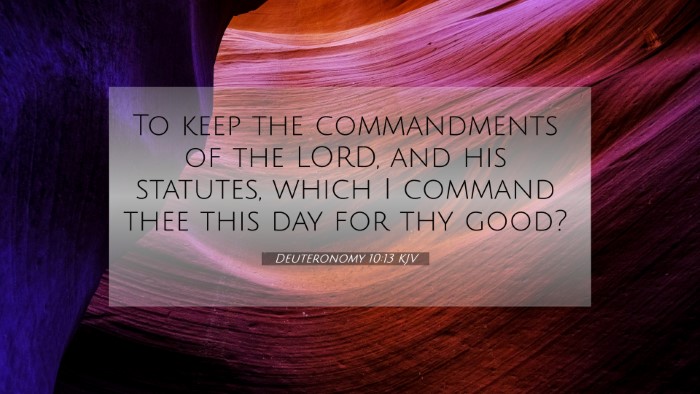Understanding Deuteronomy 10:13
Deuteronomy 10:13 states: "And to keep the commandments of the LORD, and his statutes, which I command thee this day for thy good." This verse underscores the importance of obedience to God's commandments and emphasizes the inherent benefit of following divine statutes.
Below is a collective interpretation of Deuteronomy 10:13, drawing from insights of public domain commentaries.
Commentary Insights
-
Matthew Henry:
Matthew Henry highlights that God's commandments are rooted in His love for humanity and that obedience brings about blessings. The commandment to love and serve God is depicted as both a duty and the pathway to divine favor.
-
Albert Barnes:
Albert Barnes emphasizes that the statutes commanded by God are for the believers' benefit. He suggests that God's laws are designed to maintain order and righteousness within society, ultimately leading to the prosperity of both individuals and communities.
-
Adam Clarke:
Adam Clarke notes that the commandments serve a dual purpose; they are tests of faithfulness and instructions for a moral life. Clarke indicates that these commands are not burdensome but are meant for the well-being of the community, demonstrating God's care for His people.
Bible Verse Cross-References
Deuteronomy 10:13 connects to several other scripture passages. Below are some notable cross-references that highlight similar themes of obedience, commandments, and God’s intentions for humanity:
- Exodus 20:6: "And shewing mercy unto thousands of them that love me, and keep my commandments."
- Psalm 112:1: "Praise ye the LORD. Blessed is the man that feareth the LORD, that delighteth greatly in his commandments."
- John 14:15: "If ye love me, keep my commandments."
- James 1:25: "But whoso looketh into the perfect law of liberty, and continueth therein, he being not a forgetful hearer, but a doer of the work, this man shall be blessed in his deed."
- Matthew 22:37-40: "Jesus said unto him, Thou shalt love the Lord thy God with all thy heart, and with all thy soul, and with all thy mind... On these two commandments hang all the law and the prophets."
- Romans 12:1: "I beseech you therefore, brethren, by the mercies of God, that ye present your bodies a living sacrifice, holy, acceptable unto God, which is your reasonable service."
- 1 John 5:3: "For this is the love of God, that we keep his commandments: and his commandments are not grievous."
Thematic Connections and Analysis
The analysis of Deuteronomy 10:13 reveals important themes that connect various parts of Scripture. Here are key thematic connections:
-
Obedience: The act of following God's commandments is a recurring theme throughout the Bible, reinforcing the idea that true love for God manifests in obedience. This can be related to John 14:15 and 1 John 5:3, which highlight love through obedience.
-
Divine Love and Care: The perception that God gives commandments for good reflects His love and concern for humanity. This mirrors teachings in Psalm 112:1 about blessings for those who follow His ways.
-
Moral and Ethical Living: The necessity of commandments for a just society is echoed in passages like Romans 12:1, where living a life of sacrifice and holiness is presented as a moral obligation.
Final Thoughts
Deuteronomy 10:13 serves as a compelling reminder of the imperative to align one's life with God’s commandments, not just as a duty but as a means to attain genuine happiness and fulfillment. The connections drawn between scripture deepen the understanding of God's expectations and the benefits of honoring His word. By engaging in a cross-sectional study of these biblical themes, believers can uncover profound insights that shape their spiritual journey.
Tools and Methods for Bible Cross-Referencing
To delve deeper into similar themes, the following tools and methods can enhance your Bible study experience:
- Bible Concordance: A comprehensive resource that lists the words of the Bible and their occurrences, facilitating the discovery of cross-reference themes.
- Cross-Reference Bible Study: Employ techniques that pair verses together to compare teachings and principles effectively.
- Bible Reference Resources: Utilize guides that categorize verses by themes, helping to make connections across both Old and New Testaments.






